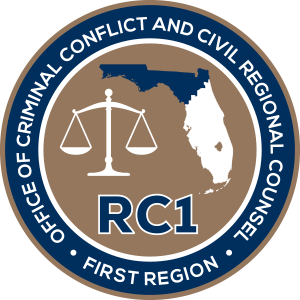An indigent defendant is a person charged with a crime who is financially unable to hire an attorney. The Public Defender is appointed and if there are other defendants on the same case or the Public Defender otherwise has a conflict of interest, the Regional Counsel is appointed
Law enforcement officers are required to advise suspects who are in custody that they have certain constitutional rights—the right to remain silent, the right to an attorney, among others. If a suspect who is in custody is not advised of his or her “Miranda” rights, any statements or evidence taken from that suspect may be suppressed as evidence in the case against that suspect. Failure to read Miranda warnings does not result in the dismissal of any charges, only in the possible “suppression” of physical evidence or statements.
RC1 attorneys are no different than private attorneys. They are licensed attorneys who have the same qualifications as any other attorneys who represent clients in Florida State courts.
No. The job of the RC1 attorneys is to represent indigent clients who have been appointed the Regional Counsel’s office by the Court.
Your attorney will explain the procedure that may include tasks on a case plan and other requirements necessary for your particular case. At any point in your case, the Court can make a determination that it is safe to return your children to you.
When a criminal defendant is determined to be indigent, the Public Defender is appointed. Sometimes the Public Defender has a conflict of interest, usually because of multiple co-defendants, so they must withdraw and RC1 is then appointed. If you are a parent in a dependency case and determined to be indigent, RC1 will always be appointed, as the Public Defender does not handle those cases.
The Florida Supreme Court has determined there is always a conflict of interest for one attorney to represent both parents in a dependency proceeding, even if you are together and have the same goal of reunification. One parent will be assigned an RC1 attorney and the other will be assigned a private attorney from a registry list.
If you are determined to be indigent in a case RC1 handles and have a lawyer appointed, the only fee you will be required to pay for representation is a $50 application fee. That fee does not go to your attorney and even if you cannot afford this fee, that will not affect your legal representation in any way.



